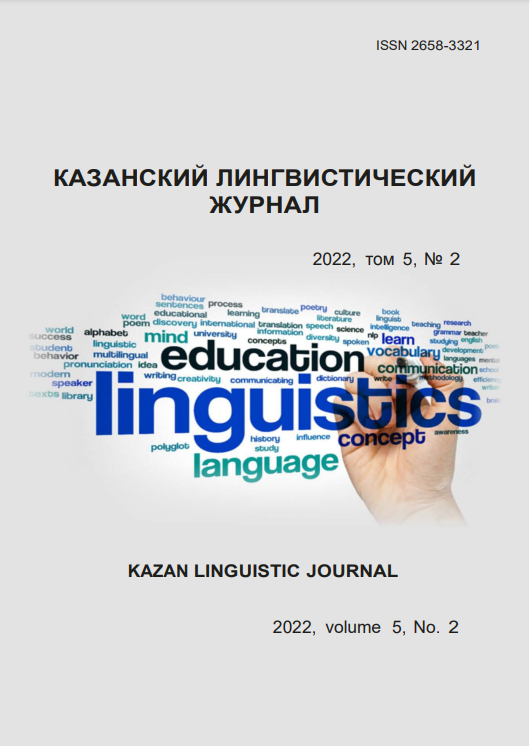Modern trends in the development of russian lexicography
https://doi.org/10.26907/2658-3321.2022.5.2.166-179
Keywords:
dictionary, lexicography, applied linguistics, dictionary integration, dictionary differentiation, internetAbstract
The study is devoted to the description of the main trends identified in modern lexicography. It is noted that lexicography continues to be an applied, practical discipline, and the main task of lexicographers is still the compilation of dictionaries. Among the current trends stand out: the reprint of dictionaries, filling them with new, relevant, in a new way meaningful language material; the emergence of varieties of dictionaries based on two opposite trends - the combination (integration) of different types of dictionaries and their differentiation; creation of dictionaries of new types (linguoculturological, cognitive, frame, functional, etc.); transferring the dictionary to the Internet space. The advantages of Internet dictionaries in interactivity, dynamism. Indeed, only with the help of such living resources is it possible to create a dictionary of a truly modern language. After all, a printed publication, even the most modern, begins to become obsolete already in the process of transferring it to the printing house. For a modern dictionary, it is not enough to simply provide a minimum of dictionary information; an analysis based on one of the promising principles (word-centric, linguoculturological, cognitive, etc.) or a combination of them is important. There is an interest of modern lexicographers not just to the word, but to the word that functions in the language and performs certain roles in the text that serve to implement the author's intentions. It is concluded that the creation of dictionaries is a never-ending process in a developed society, whose members have realized their connections with the language, understood its role in their lives, and learned its changeable nature. Driven by scientific interests, the desire to fix some phenomenon of the language, and just curiosity, people will create dictionaries until civilization disappears.
References
References
Andryushchenko V.M. Applied Linguistics. Linguistics. Big Encyclopedic Dictionary / Ch. ed. V.N. Yartseva. Moscow: Great Russian Encyclopedia; 1998: 397. (In Russ.).
Lukashanets E.G. New Word and New Dictionary: Problems of Describing Semantics in Online Slang Dictionaries. Proceedings of the Institute of the Russian Language named after V.V. Vinogradov. 2019; 19:275–282. (In Russ.).
Goncharenko I.G. Syntactic dictionaries of the Russian language and the problem of develop-ing an educational syntactic dictionary. Sociocultural space of Russia and abroad: society, educa-tion, language. 2021; 10: 22–31. (In Russ.).
Popov R.V. Regiolect dictionary as a dictionary of a new type. Bulletin of the Chelyabinsk State University. 2020; 1 (435): 133–141. DOI: 10.24411/1994-2796-2020-10117. (In Russ.).
VolskayaYu. A. Creation of a dictionary of abstract nouns in Russian: vocabulary selection cri-teria. Philology and culture. 2020; 1 (59): 38–44. DOI: 10.26907/2074-0239-2020-59-1-38-44. (In Russ.).
Elistratov V.S. Dictionary of the language N.V. Gogol: “Overcoat”. Russian language at school and at home. 2019; 19, 2:3–8. (In Russ.).
Vyshkin E.G., Nemich N.N., Khokhlova A.A. Electronic dictionaries in educational process in higher education. Vestnik of Samara State Technical University. Series: Psychological and Peda-gogical Sciences. 2021; 18, 3: 115–126. DOI: https://doi.org/10.17673/vsgtu-pps.2021.3.8. (In Russ.)
Dudkina V.G. Semantization of vocabulary and types of lexicographic definitions. Language. Text. Discourse. 2010; 8:566–574. (In Russ.).
Kozyrev V.A., Chernyak V.D. Modern orientations of domestic lexicography. Questions of lexicography. 2014; 1(5):5–15. (In Russ.).
Mokienko V.M. Russian proverbs at school (experience of educational lexicography). Bulletin of the Kemerovo State University. 2015; 1-1(61): 101–105. (In Russ.).
Khadzhaeva N.Kh. Sociolexicographic analysis of the “Explanatory Dictionary of Youth Slang” T.G. Nikitina. Bulletin of the Leningrad State University. A.S. Pushkin. 2013; 1, 1: 75–80. (In Russ.).
Bogdanova L.I. Cognitive information for explanatory dictionaries. Bulletin of Moscow Uni-versity. Series 19: Linguistics and Intercultural Communication. 2012; 2: 65–70. (In Russ.).
Tyutyunnikov N.N. Dictionary of military terms of Russian legislation: in 2 volumes. Moscow: Pero; 2018. (In Russ.).
Terminological dictionary of cultural studies / comp. V.L. Benin, E.D. Zhukov. Moscow: Flinta; 2017. (In Russ.).
Plotnikova A.M. Semantization of the word in modern explanatory dictionaries and dictionaries of concepts: new trends. Philological class. 2013; 3(33):47–50. (In Russ.).
Perevezentseva Yu.S. On the issue of modern trends in British lexicographic practice. Humani-ties, socio-economic and social sciences. 2014; 11-2:234–238. (In Russ.).
Lutseva M.V. New trends in educational lexicography (based on the Longman Exams Diction-ary). Bulletin of the Ivanovo State University. Series: Humanities. 2011; 1 (12): 60–64. (In Russ.).
Dictionary of the Russian language of the XVIII century: 22 issues / Ed. Yu.S. Sorokina, A.A. Alekseeva and others. Leningrad: Nauka; 1984-2019. (In Russ.).
Borodulina N.Yu., Makeeva M.N. Dictionary of metaphors of the economic lexicon of the Rus-sian language. Tambov: Gramota; 2010. (In Russ.).
Senichkina E.P. Dictionary of euphemisms of the Russian language. Moscow: Flinta: Nauka; 2008. (In Russ.).
Slavic antiquities: ethnolinguistic dictionary: in 5 volumes / Ed. N.I. Tolstoy. Moscow: Interna-tional relations; 1995-2012. (In Russ.).
StepanovYu.S. Constants: Dictionary of Russian Culture. Moscow: Academic Project; 2004. (In Russ.).
Functional-cognitive dictionary of the Russian language: (language picture of the world) / Ed. T.A. Kildibekova, G.V. Gafarova, L.P. Kolokolova and others; under total ed. T.A. Kildibekova. Moscow: Gnosis; 2013. (In Russ.).
Active dictionary of the Russian language: 3 volumes / V.Yu. Apresyan, Yu.D. Apresyan, E.E. Babaeva and others; resp. ed. Yu.D. Apresyan. Moscow: Languages of Slavic culture; 2014¬2017. (In Russ.).
Elina E.N., Kuznetsova L.I. Cognitive bases of educational frame dictionary: monograph. Krasnoyarsk: Sib. feder. un-t; 2016. (In Russ.).
Wiktionary. Available from: http://ru.wiktionary.org/wiki/[accessed 09.05.2022] (In Russ.).
Efremova T.F. New dictionary of the Russian language. Explanatory and derivational. Available from: https://classes.ru/all-russian/russian-dictionary-Efremova.htm [accessed 09.05.2022] (InRuss.).
Academic explanatory dictionary of the Russian language. Volume 1: A – Viljat'; Volume 2: Vina – Gjaur / Resp. ed. L.P. Krysin. Moscow: Languages of Slavic cultures; 2016. (In Russ.).






